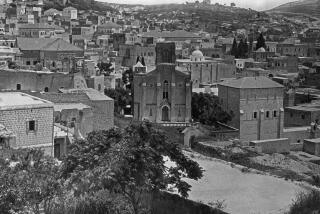Against the Odds
With the gradual passage of those who survived the Holocaust and World War II as adults, we have an increasing number of memoirs of the generation that experienced that time as children. Aldo Zargani was born in 1933 and was 5 when Benito Mussolini passed the racial laws that forced him to leave Italian public schools and cost Zargani’s father, a violinist, his job. Zargani was 7 when Italy entered World War II and 10 in 1943, when Italy tried to withdraw from the war and was occupied by Nazi Germany, forcing the Zarganis--father, mother and two sons--to spend a terrifying year and a half in hiding.
“For Solo Violin” is a gracefully written, elegiac memoir of childhood that effectively renders the pain, psychological dislocation and fear of coming of age under the shadow of fascism’s racial laws and Mussolini’s disastrous alliance with Hitler’s Germany. The book is a useful corrective to the many books and articles that have tended to downplay the havoc that Mussolini’s racial policies wreaked because they stopped short of the extermination program of Nazi Germany. As Zargani notes, he did not distinguish as a child between fascism and Nazism because by the German occupation of 1943, Italian fascists and German Nazis were working together to arrest and deport the country’s Jews.
Zargani paints a number of affecting thumbnail sketches of the many relatives and family friends who were captured and killed. While others have stressed that Italy’s Jews had among the highest survival rates of Europe’s Jewish population, Zargani notes that between a quarter and a third of those left in the country by 1943 perished, which, given the brevity of the Germany occupation, means that deportation and death were hardly exceptional events.
Because these are childhood memories, “For Solo Violin” is more a series of fragmentary scenes and vignettes than a coherent, complete narrative of the family’s experience. Following the promptings of memory, Zargani moves back and forth in time, producing a narrative that is, at times, poetical and finely re-imagined but also, at times, choppy and confusing. This impressionistic approach leaves us, however, with some powerful memories that convey the sense of material life at that time: the excitement and luxury of riding in an automobile in Italy in the 1930s; learning to skin moles and cook chestnuts during the terrible hunger and deprivation of the war; a boy whose only word is “goat”; a poor, illiterate family that lives on hunted cats and small-time theft.
One vignette perhaps best sums up the weird combination of anti-Semitism and generosity that Zargani experiences. After the war ended, the old peasant woman who had helped hide his family asked Zargani’s mother: “Please explain to me, Madam, if you don’t mind, how nice people like you can eat babies every year at Easter?” The woman had evidently absorbed the centuries of Catholic preaching about Jewish ritual murder and yet it did not prevent her from risking her life to save a Jewish family.
More to Read
The biggest entertainment stories
Get our big stories about Hollywood, film, television, music, arts, culture and more right in your inbox as soon as they publish.
You may occasionally receive promotional content from the Los Angeles Times.










